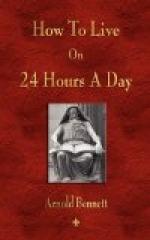The study of cause and effect, while it lessens the painfulness of life, adds to life’s picturesqueness. The man to whom evolution is but a name looks at the sea as a grandiose, monotonous spectacle, which he can witness in August for three shillings third-class return. The man who is imbued with the idea of development, of continuous cause and effect, perceives in the sea an element which in the day-before-yesterday of geology was vapour, which yesterday was boiling, and which to-morrow will inevitably be ice.
He perceives that a liquid is merely something on its way to be solid, and he is penetrated by a sense of the tremendous, changeful picturesqueness of life. Nothing will afford a more durable satisfaction than the constantly cultivated appreciation of this. It is the end of all science.
Cause and effect are to be found everywhere. Rents went up in Shepherd’s Bush. It was painful and shocking that rents should go up in Shepherd’s Bush. But to a certain point we are all scientific students of cause and effect, and there was not a clerk lunching at a Lyons Restaurant who did not scientifically put two and two together and see in the (once) Two-penny Tube the cause of an excessive demand for wigwams in Shepherd’s Bush, and in the excessive demand for wigwams the cause of the increase in the price of wigwams.
“Simple!” you say, disdainfully. Everything—the whole complex movement of the universe—is as simple as that—when you can sufficiently put two and two together. And, my dear sir, perhaps you happen to be an estate agent’s clerk, and you hate the arts, and you want to foster your immortal soul, and you can’t be interested in your business because it’s so humdrum.
Nothing is humdrum.
The tremendous, changeful picturesqueness of life is marvellously shown in an estate agent’s office. What! There was a block of traffic in Oxford Street; to avoid the block people actually began to travel under the cellars and drains, and the result was a rise of rents in Shepherd’s Bush! And you say that isn’t picturesque! Suppose you were to study, in this spirit, the property question in London for an hour and a half every other evening. Would it not give zest to your business, and transform your whole life?
You would arrive at more difficult problems. And you would be able to tell us why, as the natural result of cause and effect, the longest straight street in London is about a yard and a half in length, while the longest absolutely straight street in Paris extends for miles. I think you will admit that in an estate agent’s clerk I have not chosen an example that specially favours my theories.
You are a bank clerk, and you have not read that breathless romance (disguised as a scientific study), Walter Bagehot’s “Lombard Street”? Ah, my dear sir, if you had begun with that, and followed it up for ninety minutes every other evening, how enthralling your business would be to you, and how much more clearly you would understand human nature.




